Books
Books
published in 2021

Verlag der Buchhandlung Walther König
#GIVEPOETRYATRY
The artist’s book ‘#GIVEPOETRYATRYCOLLECTEDPOETRY1990-2020…’ features thirty years of Karl Holmqvist’s artist’s writing in the form of spoken word and concrete poetry, together with signature “cover versions” of lyrics from singer-songwriters such as Robyn and Taylor Swift. The book’s tightly written A4 format pages and cardboard-box-brown no-nonsense cover has been designed in a collaborative effort between the artist and designer Dan Solbach.
‘#GIVEPOETRYATRYCOLLECTEDPOETRY1990-2020…’ Karl Holmqvist’s artist’s book of collected poetry is published by Verlag der Buchhandlung Walther und Franz König on the occasion of projects at the Fridericianum, Kassel and gta exhibitions, ETH Zurich.

Little Joy: Selected Stories
Poet, writer, and translator Cecilia Pavón emerged in the late 1990s as one of the most prolific and central figures of the young Argentine literary scene—the so-called “Generation of the 90s”: artists and writers whose aesthetics and politics were an earnest response to the disastrous impact of American-exported neoliberal policies and the resulting economic crisis of 2001. Their publications were fragile—xeroxed, painted on cardboard—but their cultural impact, indelible.
A cofounder of Buenos Aires’s independent art space and publishing press Belleza y Felicidad—where a whole generation of soon-to-be-famous Argentine artists showed their work for the first time—Pavón pioneered the use of “unpoetic” and intimate content—her verses often lifted from text messages or chat rooms, her tone often impish, yet brutally sincere.
In 2015, Pavón’s first volume of collected poems, ‘A Hotel with My Name’, was published in English. Contemporary writers in the United States, Australasia, and Europe discovered a deep affinity with her work. Pavón’s protagonists, Ariana Reines noted, “are absolute women, guileless dreamers, saints in sneakers, on sidewalks, in jail, in Zara, on buses, in nightclubs, in bed.”
Translated by Pavón’s own poetic protégé Jacob Steinberg, ‘Little Joy’ collects the best of Pavón’s short stories written between 1999-2020, originally published in three volumes in Spanish.
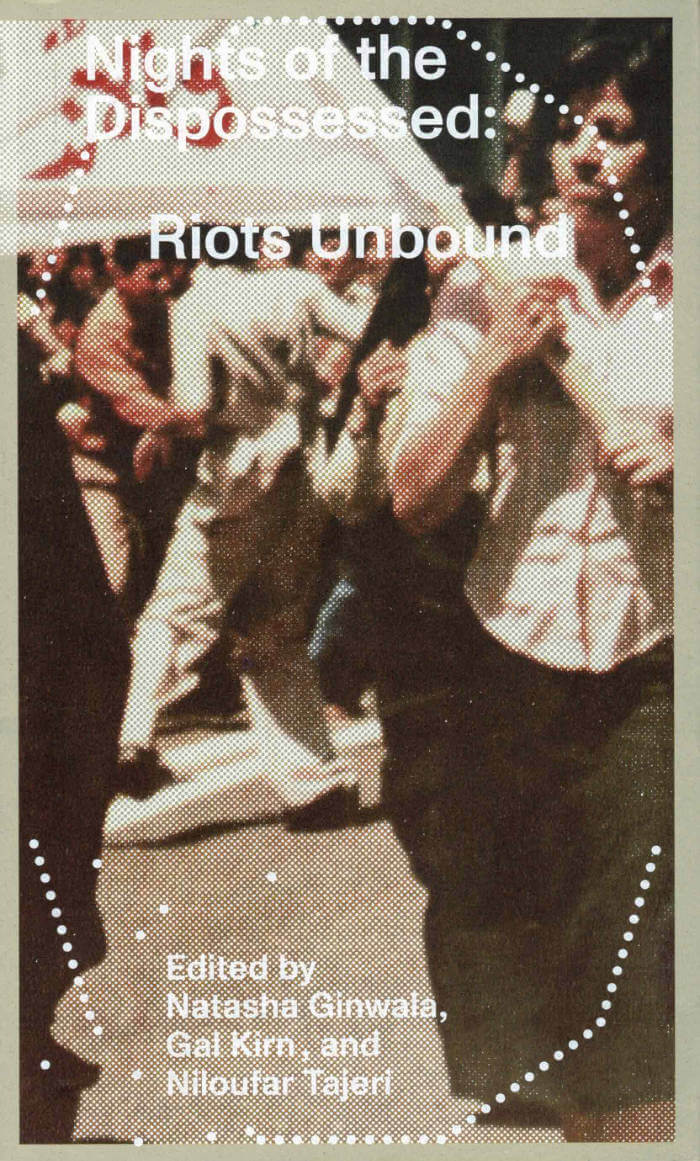
Nights of the Dispossessed
Natasha Ginwala, Gal Kirn and 1 more
Riots are extraordinary events that have been recurring with increasing frequency and occupy a highly controversial space in the political imagination. Despite their often negative portrayals, it is undeniable that riots have played a pivotal role in the confrontation between authority and dissent. Recently, with the deepening crises of capitalism, racial violence, and communal tension, an “age of riots” has powerfully begun. As master fictions of the sovereign nation-state implode, and the hegemonic silencing of the dispossessed reveals the cracks in governability, Nights of the Dispossessed: Riots Unbound brings together artistic works, political texts, critical urban analyses, and research projects from across the world in an endeavor to “sense,” chronicle, and think through recent riots and uprisings—evoking a phenomenology of the multitude and surplus population.
With contributions from Asef Bayat, Joshua Clover, Vaginal Davis, Keller Easterling, Zena Edwards, Nadine El-Enany, Dilip Parameshwar Gaonkar, Gauri Gill, Natasha Ginwala, Natascha Sadr Haghighian, Louis Henderson, Satch Hoyt, Hamid Khan, Gal Kirn, Josh Kun, Léopold Lambert, Margit Mayer, Vivek Narayanan, Ai Ogawa, Oana Pârvan, Elizabeth A. Povinelli, SAHMAT, Thomas Seibert, Niloufar Tajeri, Chandraguptha Thenuwara, Dariouche Tehrani, and Ala Younis.
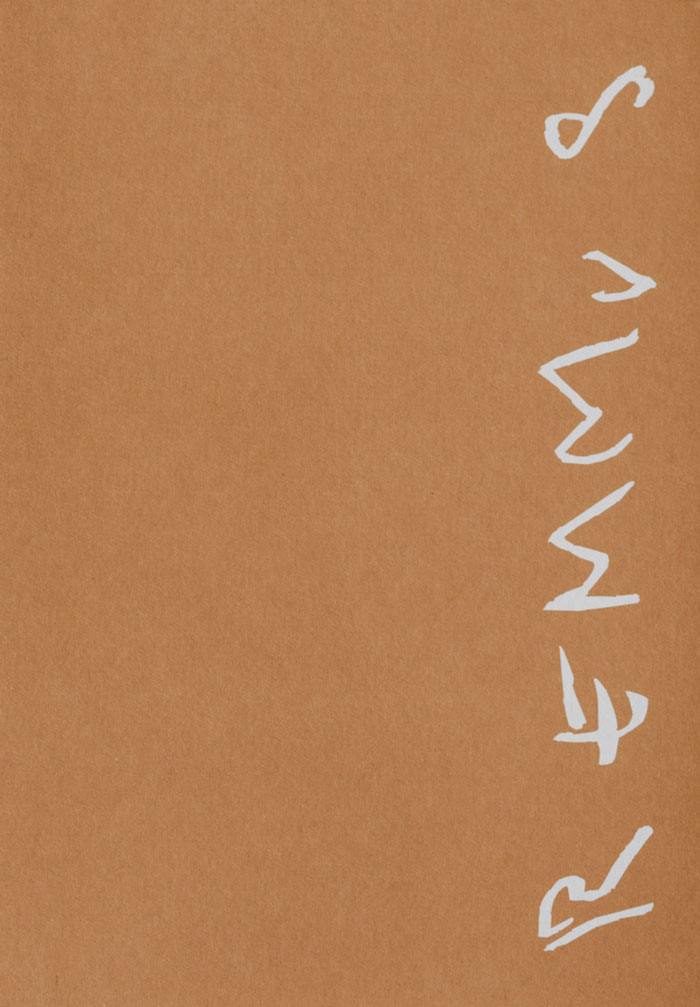
REMMUS
When living things bloom & molder all in a heartskip, when they expand toward death, this is what worms hear.
Artist’s book of paintings by Mikołaj Moskal: gouache, archival paper elements, simple & meaningful captions. REMMUS is a graft of Podlasie earth-water-sky and Mikołaj’s pigments, heart, and intuition. Designed in close collaboration with graphic artist and designer Kaja Gliwa.
The paintings are bracketed by a poem each by Kuba Niklasiński (“Flows | Flaws”) and Stefan Lorenzutti (“What Worm Heard”), handwritten by Mikołaj in English and Polish.

To Be Determined: Photography and the Future
To Be Determined: Photography and the Future proposes a radical concept: that the photograph is as much an object of the future as it is of the past. Exploring a familiar medium with new eyes, this series of short essays asserts that photographic technologies are geared towards a world to come, not a world that has been.
The book proposes that artists and photographers who question photography’s capacities – to transform our relationship to time, rewire our perception, and describe our encounters with technology – can change our perception of our own agency and our capacity to see, think and act.

Sambac Beneath Unlikely Skies
Tender yet brutal vignettes on a girlhood in Gaza, Palestine, filled with honey and warmth.
Winner of the Creative Award in the 2022 Palestine Book Awards.
Chosen as a 2021 Book of the Year by The White Review, Middle East Eye & The New Arab.
Sambac Beneath Unlikely Skies is written for those who had to leave—collected remembrances of a childhood in Gaza by a woman far from Palestine’s sun and sea. Overindulgent, chaotic and sentimental, Heba Hayek’s narrator struggles to navigate life in colder, unfamiliar worlds. She holds tightly to memories of home, hoping they will lead back to her sisters and mothers.
With brilliance and grace, Hayek’s vignettes explore the methods of survival nurtured by Palestinian women in the face of colonial occupation and patriarchy—the power of community care, and of loving what’s not meant to be loved. Her reflections reveal the intimate magnificence and quiet devastation of everyday life: a family drive on the shore, waxing for the first time with aunties, or peeling figs while waiting at a checkpoint.
Heba Hayek is a London-based, Gaza-raised Palestinian author, creative and facilitator. She completed an MFA in Creative Writing at Miami University, Ohio, and studied for an MA in Social Anthropology at SOAS University of London.
Heba’s first book, Sambac Beneath Unlikely Skies, won the Creative Award in the 2022 Palestine Book Awards and was chosen as a 2021 Book of the Year by The White Review, Middle East Eye and The New Arab.

Brick by Brick: How We Build a World Without Prisons
The fight for prison abolition is a struggle for collective liberation: a transformative vision of a safer world, in which communities live free from exploitation on a thriving planet.
Drawing connections across social justice movements with a shared abolitionist ethic, this revolutionary book illuminates how harmful ideas of criminality and punishment can manifest in many ways beyond the prison industrial complex. This work is a collaboration with friends, mentors and giants fighting for housing justice, food justice, climate justice, migrant justice, justice for survivors of violence, and more.
With this insightful and generous book, now in its second edition, Cradle Community invites us to explore what it will take to dismantle structures of oppression, and to imagine the future we can rebuild together—brick by brick.
Cradle Community is a collective of organisers committed to radical education and building understanding of prison abolition and transformative justice. Brick by Brick is their first book.

Experiments in Imagining Otherwise
This is a book of failure and mistakes; it begins with what is stolen from us and proposes only an invitation to imagine.
In these playful written experiments, Lola Olufemi navigates the space between what is and what could be. Weaving together fragmentary reflections in prose and poetry, this is an exploration of the possibility of living differently, grounded in black feminist scholarship and political organising.
Olufemi shows that the horizon is not an immaterial state we gesture toward. Instead, propelled by the motion of thinking against and beyond, we must invent the future now and never let go of the otherwise.
Lola Olufemi is a black feminist writer and CREAM/Stuart Hall Foundation researcher from London. Her work focuses on the uses of the feminist imagination and its relationship to futurity, political demands and imaginative-revolutionary potential. She is the author of Experiments in Imagining Otherwise and Feminism, Interrupted: Disrupting Power, the co-author of A FLY Girl’s Guide to University, and a member of ‘bare minimum’, an interdisciplinary anti-work arts collective.

In Concrete
Garréta’s first novel in a decade follows the mania that descends upon a family when the father finds himself in possession of a concrete mixer. As he seeks to modernize every aspect of their lives, disaster strikes when the younger sibling is subsumed by concrete.
Through puns, wordplay, and dizzying verbal effect, Garréta reinvents the novel form and blurs the line between spoken and written language in an attempt to confront the elasticity of communication.
Anne F. Garréta is a graduate of the Ecole Normale Supérieure, received her License de Lettres at the Université Paris 4 (Sorbonne), her Maitrise and her D.E.A at the Université Paris 7 (Diderot), and a PhD at New York University. The author of six novels, Garréta was coopted to the Oulipo in 2000. Her first novel, Sphinx (1986), which caused a sensation when Deep Vellum published its first English translation in 2015, tells a love story between two people without giving any indication of grammatical gender for the narrator or their lover. She won France’s prestigious Prix Médicis in 2002 and the Albertine Prize in 2018 for her book, Not One Day, which was also nominated for a Lambda Literary Award. Garréta teaches regularly in France at the Université Rennes 2, and more recently at Paris 7 (Diderot), and is a professor at Duke University.
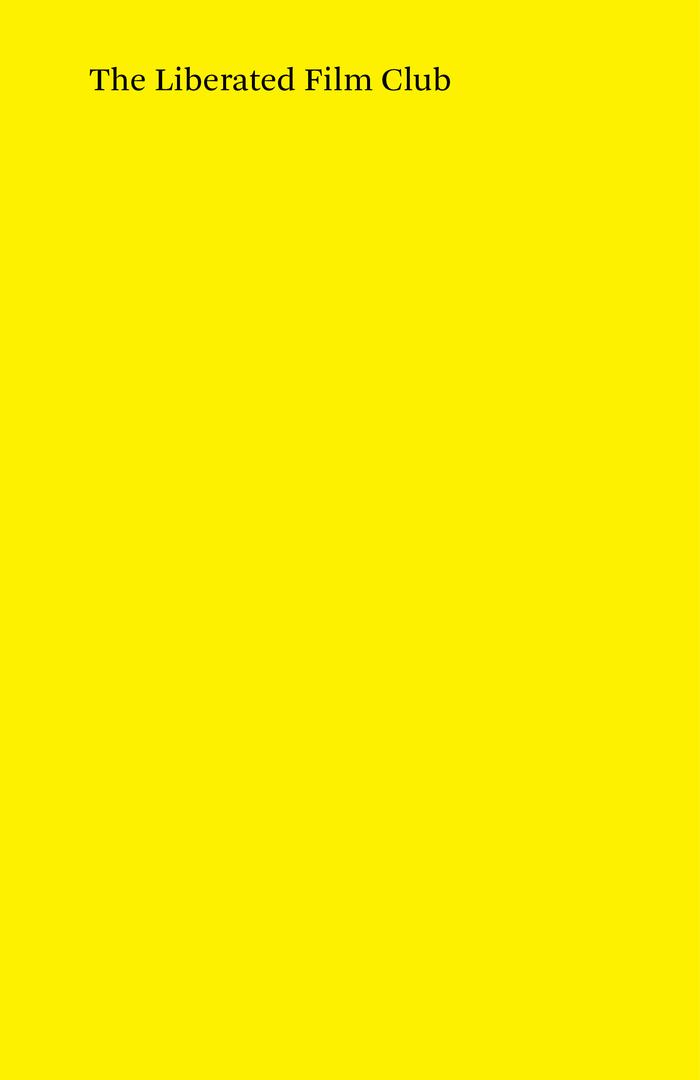
The Liberated Film Club
The Liberated Film Club—running from its birth to its death, 2016 to 2020—would guarantee a wide wing-span for critical conversation. Screening “Liberated film” (a loose category designed to scaffold the show), a guest would be invited to introduce a film; an audience seated to watch it through; but there’d be an interruption to that typical format. Neither the audience nor the guest would have any idea what film would be shown, and this anonymised format would invite broad and antagonistic perambulation on the what, the why and the how of film.
An interrogation of what we do when we sit in a cinema; a reckoning with the kind of posture we should assume when we frame a film for further talk. Playing with the various ways we should consider and reproach the institutions built around all of our cultures of making and the manners and methods of all of our cultures of consumption, the Liberated Film Club was a rare reflection on the act of reflection itself.
An anthology publication,
featuring contributions from
John Akomfrah;
Chloe Aridjis;
Dennis Cooper;
Laura Mulvey;
Chris Petit;
Mania Akbari;
Elena Gorfinkel;
Juliet Jacques;
Ben Rivers;
Dan Fox;
Sean Price Williams;
Adam Christensen;
Stewart Home;
Stephen Watts;
Tony Grisoni;
Gideon Koppel;
Astra Taylor;
Miranda Pennell;
Gareth Evans;
Adam Roberts;
Tai Shani;
Anna Thew;
Xiaolu Guo;
Andrea Luka Zimmerman;
William Fowler;
Athina Tsangari;
John Rogers;
Shama Khanna;
Shezad Dawood;
Damien Sanville;
& Stanley (& Winstanley) Schtinter.
(Eds.) Stanley Schtinter,
with Dominic J. Jaeckle
& Jon Auman
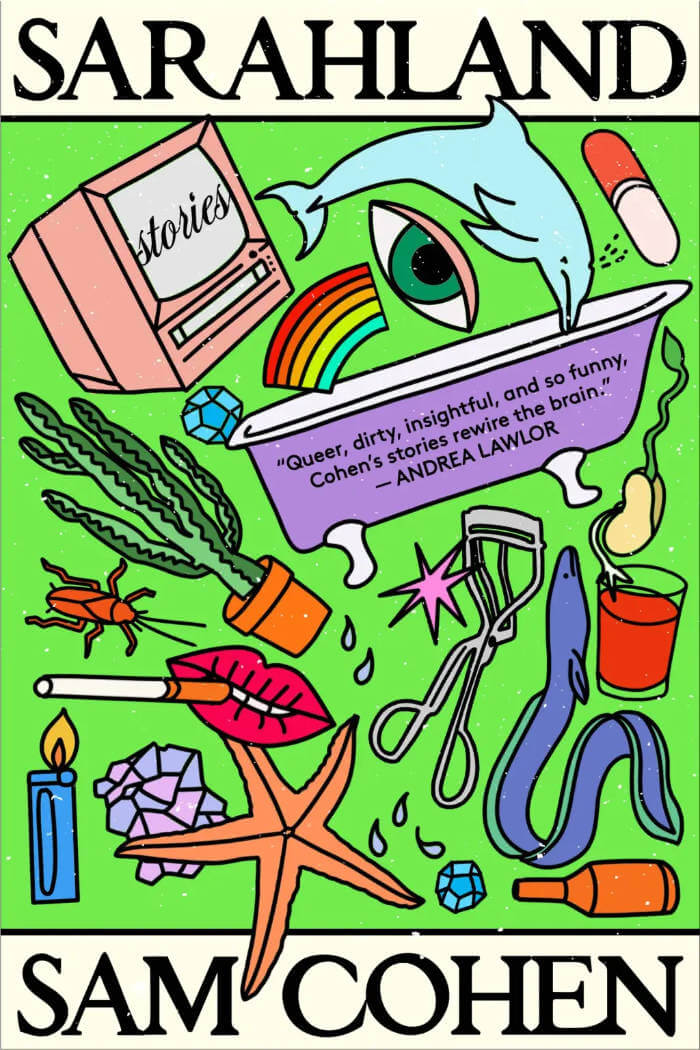
Sarahland
In Sarahland, Sam Cohen brilliantly and often hilariously explores the ways in which traditional stories have failed us, both demanding and thrillingly providing for its cast of Sarahs new origin stories, new ways to love the planet and those inhabiting it, and new possibilities for life itself. In one story, a Jewish college Sarah passively consents to a form-life in pursuit of an MRS degree and is swept into a culture of normalized sexual violence. Another reveals a version of Sarah finding pleasure—and a new set of problems—by playing dead for a wealthy necrophiliac. A Buffy-loving Sarah uses fan fiction to work through romantic obsession. As the collection progresses, Cohen explodes this search for self, insisting that we have more to resist and repair than our own personal narratives. Readers witness as the ever-evolving "Sarah" gets as a bible-era trans woman, an aging lesbian literally growing roots, a being who transcends the earth as we know it. While Cohen presents a world that will clearly someday end, "Sarah" will continue.
In each Sarah's refusal to adhere to a single narrative, she potentially builds a better home for us all, a place to live that demands no fixity of self, no plague of consumerism, no bodily compromise, a place called Sarahland.
"Queer, dirty, insightful, and so funny" (Andrea Lawlor), this coyly revolutionary debut story collection imagines new origins and futures for its cast of unforgettable protagonists—almost all of whom are named Sarah.
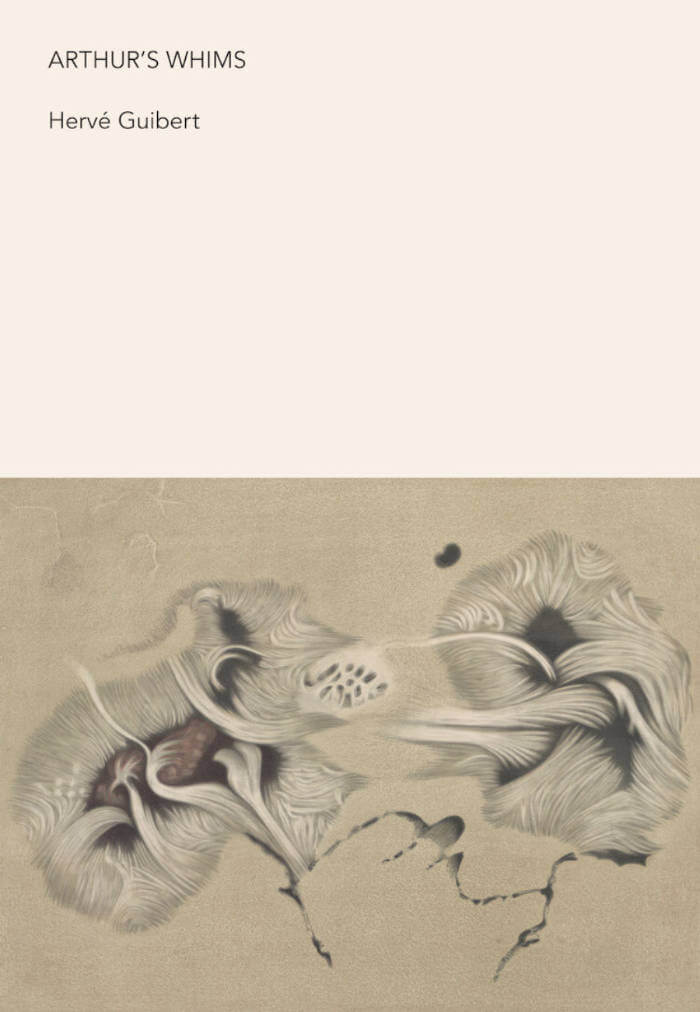
Arthur’s Whims
Arthur’s Whims is the tale of “a modern saint,” a love story born of a childhood dream of being “alone on a boat with a boy, a friend.” Arthur and his beloved Bichon—a young man who, after drinking Arthur’s tears, becomes pregnant with his child—drift through a stream of identities and circumstances: birdcatchers for a French taxidermist; sailors shipwrecked in an ice fortress; explorers of the Isles of Traitors, Babies, and Sadness; famous magicians in Oklahoma; religious and medical marvels. It is an anarchic, outrageous novel, in the tradition of Edgar Allan Poe and Comte de Lautréamont, now available in English for the first time in translation by Dana Lupo. This edition includes Hervé Guibert’s essay “The Bear,” in which he compares his books to rooms in a house, writing: “Arthur’s Whims would be the library of the house, and the bedroom of a child who will never be.” It is “a true adventure novel in the tradition of the genre, or what I believed to be its tradition, with great journeys, disasters, shipwrecks, cataclysms.”
“This short novel, offered here along with an essay by Guibert, reads like a madcap picaresque—one in which bodies can transform, the pace is constantly accelerating, and geography proves to be malleable. A gloriously surreal account of an unexpected voyage.” — Tobias Carroll, Words Without Borders
Hervé Guibert was a French photographer, critic, and author. Born in 1955, he published works of autofiction, novels, short stories, and essays, including many on photography. His writing was often deeply personal, ironic, and centered on illness and the body. Guibert died from complications of AIDS in 1991, at the age of thirty-six.
Dana Lupo is a writer and translator based in New York. Their work has appeared in Entropy, Bone & Ink Press, Arcturus (Chicago Review of Books), Apricity Press, and elsewhere. Arthur’s Whims is their first published translation.

Hortus
The Hortus project is an open investigation into the nature of seemingly common objects through 'Floriography', urban gardens, and the history of female rights. Hortus was inspired by urban gardens in West Amsterdam and created with its plants by Lilia Luganskaia.
Joanna Cresswell about the 'Hortus':
History teaches us that a language of flowers can communicate endless things about the culture in which it emerged, and herein lies Lilia Luganskaia's interest. Taking inspiration from the world of 19th Century sentimental flower books, Hortus presents itself as a set of notes towards a modern handbook for contemporary floriography, considering what the discipline might look like today. By collecting common flora across one year in the urban gardens around her home in Amsterdam and cross-referencing their meanings with publications from the past, Luganskaia reflects on their natures, their roles, and the symbolic familiarity they might hold for the communities living with them. A female artist and reader of the twenty-first century, she seeks out the essence of modern life through her lens, and through flowers, just like the women who came before her.
Lilia Luganskaia (1990) Russian - Dutch multidisciplinary artist and author, based in Amsterdam. In her artistic practice, Lilia uses her background in documentary techniques to focus on what she calls ‘investigating reality’. Her practice is research-based, Lilia decodes abstract notions such as love, tourism, bureaucracy, politics, and feminism through the use of constructed images, sculptures, videos, and installations. One of the key elements of her work is to understand multiple aspects of the photographic image.

Protoplasmic Flow
One of artist Jenna Sutela's regular collaborators, Physarum polycephalum, is often referred to as a natural computer. This yellow, ‘many-headed’ slime mold is an ancient, decentralized, autonomous organism that processes data without a nervous system, operating via communities of coordinated nuclei that demonstrate advanced spatial intelligence. If the slime mold cannot find the resources it needs, it hibernates until better conditions arise; theoretically, it is immortal. Over the years, Sutela has, for example, ingested the slime mold in her performances as a form of artificial intelligence, letting its hive-like behavior program her own.
Sutela's work for Samara reactivates this line of work, delivering co-existence with the slime mold to people's homes in the form of a dried sample of Physarum polycephalum as well as related performative instructions. Inside the box, the audience receives everything necessary to grow slime mold at home, and witness the behaviour of this fascinating organism. With the set of performative instructions, Jenna Sutela proposes the ways of co-existing and engaging with Physarum polycephalum.
Jenna Sutela works with words, sounds, and other living media, such as Bacillus subtilis nattō bacteria and the “many-headed” slime mold Physarum polycephalum. Her audiovisual pieces, sculptures, and performances seek to identify and react to precarious social and material moments, often in relation to technology. Sutela's work has been presented at museums and art contexts internationally, including Guggenheim Bilbao, Moderna Museet, and Serpentine Galleries. She is a Visiting Artist at The MIT Center for Art, Science & Technology (CAST) in 2019-21.
Protoplasmic Flow contains everything required to activate the slime mold in a location of your choosing.
Duration: take all the time that you need
Language: Instructions are in English and Italian.

… Through Practices
The books included in the series ‘Choreography as Conditioning’ are rooted in a cycle of work sessions entitled CASC at KASK, in which students work together with invited guests. They explore the notions of choreography, understood as ways of organizing subjects in their surroundings, and conditioning in both art-making and society-making. Where, how, and by whom are things organized and what kind of landscapes of experience are made (im)possible by the practices we enact and encounter?
‘… Through Practices’ is written by artist researchers who have been involved in a three-day public symposium with the same title, exploring ecologies of attention, awareness, senses of participation, and agencies of practice. It presents resonances and sedimentations of individual, shared, and collective practices, mirroring different forms of participating and responding—diverse in/capacities, im/possibilities, and dis/interests as they appear in and through experience.

Choreography as Self-Conditioning — A Written Exhibition
he books included in the series ‘Choreography as Conditioning’ are rooted in a cycle of work sessions entitled CASC at KASK, in which students work together with invited guests. They explore the notions of choreography, understood as ways of organizing subjects in their surroundings, and conditioning in both art-making and society-making. Where, how, and by whom are things organized and what kind of landscapes of experience are made (im)possible by the practices we enact and encounter?
The fourth book, ‘Choreography as Self-Conditioning’, presents a ‘written exhibition’. It consists of re-scripted scores originally developed for the architectural space and the live audience of ‘House of Ear’, an immersive and intro-active sound parcours conceived and curated by David Helbich and Joris Blanckaert. These scores are DIY versions of the original works that invite readers to re-activate and engage with the thinking processes they stem from.

KAMERA CAHIER N° 2
A special edition issue curated, designed and published by AVARIE, Paris and Labor Neunzehn, Berlin. It accompanies KAMERA SERIES, while it is an independent and valuable object to collect.
The central idea that informs and directs the booklets’ montage is the interplay between the concepts of addition and subtraction. This is achieved by unveiling a missing image in the screening or an unreleased second from an artist's film, expanded to 24 pages. Additionally, each booklet contains a piece directly removed from the show.
The editing establishes a dialogue between film frames and performed writings derived from texts, scripts, storyboards, and notes. The KAMERA exhibition is consequently extended into a physical space—the book—allowing for its widespread dissemination, complementing and contrasting with its potential online occurrence.
KAMERA SERIES is a screening program of experimental films, video art works and printed matter taking place in a former GDR building in Berlin.
75 numbered copies + 16 mm film print
24 pages / color plates
book size 21 x 14,5 cm
papers fedrigoni sirio rough pearl 210 and arena white rough 120
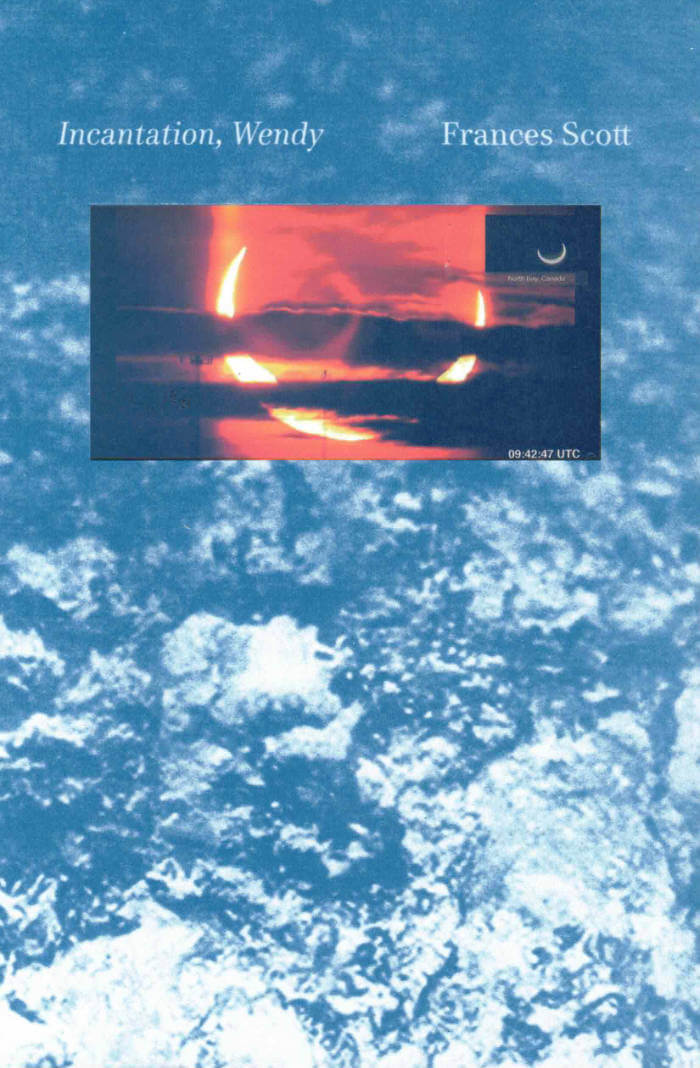
Incantation, Wendy
This book is an incantation for Wendy (2023), a film fan letter from artist Frances Scott to composer Wendy Carlos. Written contributions from Beth Bramich, Stine Hebert, Juliet Jacques, Tom Richards, Chu-Li Shewring and Dave Tompkins are accompanied by hand-drawn music scores, film stills and script notes produced during Scott’s research, and her moving-image work Valentina (2020), a rehearsal to camera with performer Valentina Formenti.
Incantation, Wendy precedes the film Wendy and meditates on Carlos as ‘The Original Synth’, moving across channels that speak of the unbounded voice in collaboration, synthesis and transition; through vocoders, archives, re-readings, light pulses, solar flares and cyclical returns; and in concert with horses, moons and a sun, eclipsing as it rises above the horizon.

The Hearing Trumpet
An old woman enters into a fantastical world of dreams and nightmares in this surrealist classic admired by Björk and Luis Buñuel.
Leonora Carrington, painter, playwright, and novelist, was a surrealist trickster par excellence, and The Hearing Trumpet is the witty, celebratory key to her anarchic and allusive body of work. The novel begins in the bourgeois comfort of a residential corner of a Mexican city and ends with a man-made apocalypse that promises to usher in the earth's rebirth. In between we are swept off to a most curious old-age home run by a self-improvement cult and drawn several centuries back in time with a cross-dressing Abbess who is on a quest to restore the Holy Grail to its rightful owner, the Goddess Venus. Guiding us is one of the most unexpected heroines in twentieth-century literature, a nonagenarian vegetarian named Marian Leatherby, who, as Olga Tokarczuk writes in her afterword, is "hard of hearing" but "full of life."

The Clip-On Method
The Clip-On Method is THE book on the work of Cady Noland everybody was waiting for but nobody expected. Two volumes, almost 600 pgs, that gather a minute, specific, documentation of the artist’s works (“often shown within their first installations,” from 1984 onwards) and further unfold the issues and questions that form the core of her practice and structure her engagement in art – without imposing any interpretation, critical perspective, other than the one proposed (suggested) by the artist’s own approach to the book form.
Book 1 gathers documents, essays, sholarly texts and articles regarding capitalism, violence, aircraft industry, racial discrimination in US universities, amongst various issues, interspersed with pictures of the artist’s works.
In Book 2 there are more photographs along with an exciting, impressive collection of writings by Noland (including, of course, “Towards a Metalanguage of Evil”). Most of the texts, and several of the pictures as well, are presented as facsimiles, laying out the work process, and the origins of what forms that sum.
Design by Cady Noland, Will Holder
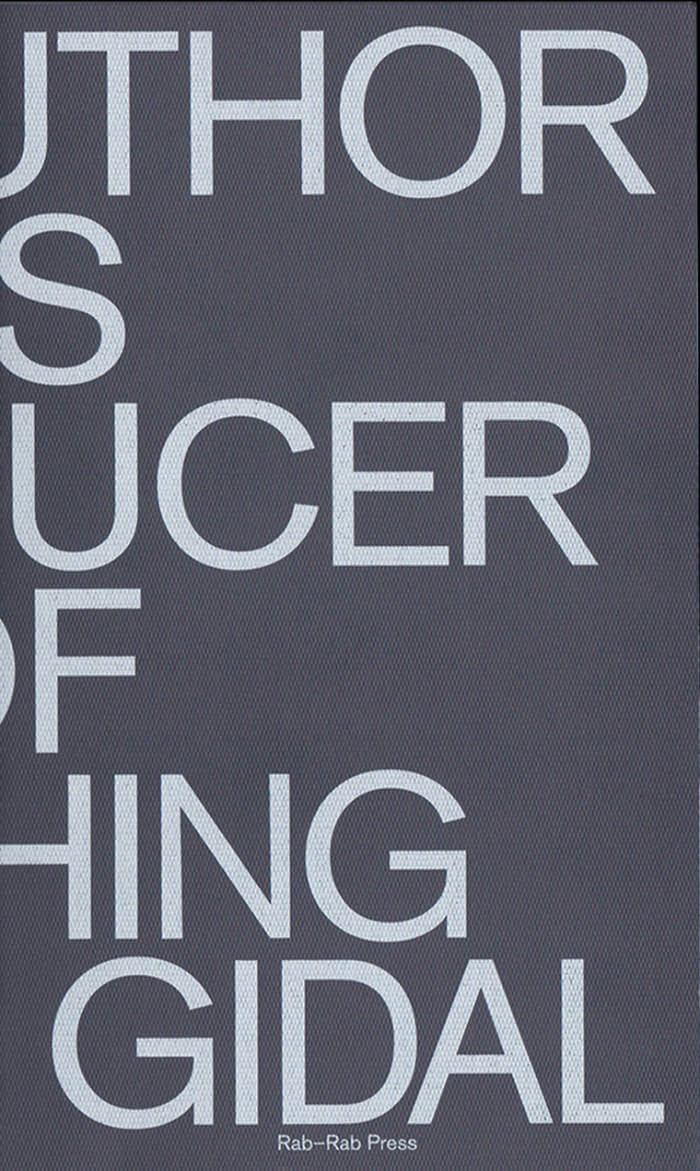
The Author as Producer of Nothing
The first publication of a lost 1978 text by Peter Gidal—one of the most influential experimental filmmakers ever.
The book includes the first publication of Peter Gidal's text from 1978, with a new introduction. Gidal in this dense theoretical essay deals with the limits of language and representation in the practice of experimental filmmaking and writing. Gidal's lost text The Author as Producer of Nothing will give a new insight into the theoretical and political context to experimental film practices.
The afterword by Sezgin Boynik discusses in detail the political contradictions of Gidal's filmic non-objectivity.
"The process of the film's making deals with devices that result in demystification or attempted demystification of the film process. But by 'deals with' I do not mean 'represents'. In other words, such films do not document various film procedures, which would place them in the same category as films which transparently document a narrative, a set of actions, etc. Documentation, through usage of the film medium as transparent, invisible, is exactly the same when the object being documented is some 'real event', some 'film procedure', some 'story', etc. An avant-garde film defined by its development towards increased materialism and materialist function does not represent, or document, anything. The film produces certain relations between segments, between what the camera is aimed at and the way that 'image' is presented. The dialectic of the film is established in that space of tension between materialist flatness, grain, light, movement, and the supposed reality that is represented. Consequently a continual attempt to destroy the illusion is necessary."—Peter Gidal
Peter Gidal (born 1946 in New York) is an influential British film theorist and avant-garde filmmaker, associated with the English "Structural/Materialist" movement (along with Malcolm Le Grice notably). He has published in numerous magazines (Studio International, Screen, October, Undercut) and is the author of several books, including Andy Warhol: Films and Paintings (1971), Materialist Film (1988) and Understanding Beckett: A Study of Monologue and Gesture in the Works of Samuel Beckett (1986).

Vogliamo Tutto – Cultural Practices and Labor
Nicola Ricciardi, Samuele Piazza
Vogliamo Tutto. Cultural Practices and Labor has its origin in the novel Vogliamo tutto (1971) by Nanni Balestrini, whose protagonist Alfonso Natella became the voice of an entire generation as well as the workers' movements in 1968 Turin. In 2021, thirteen artists were invited to reflect on the change of labor in the contemporary context.
The result is a sum of choral voices and practices, which together outline the peculiar transformative nature of labor and its socio-cultural context over a wide time span: from the impact of the Industrial Revolution to the post-industrial decline and the shifts of the digital era.
The book features two essays by Samuele Piazza and Nicola Ricciardi, curators of the eponymous exhibition at OGR Torino; new writing by the artists Claire Fontaine and Tyler Coburn; and archive texts selected by the artists in the show: Andrea Bowers, Pablo Bronstein, Claire Fontaine, Tyler Coburn, Jeremy Deller, Kevin Jerome Everson, LaToya Ruby Frazier, Elisa Giardina Papa, Liz Magic Laser, Adam Linder, Sidsel Meineche Hansen, Mike Nelson, and Renate Wiehager for Charlotte Posenenske.
The archive texts include the essays "Automation and the Invisible Service Function" by Neda Atanasoski and Kalindi Vora; "Audio Poverty"Diedrich Diederichsen; "Sabotage" by Elizabeth Gurley Flynn; "Wages Against Housework" by Silvia Federici; "The Wreck of the Sea-Venture" by Peter Linebaugh and Marcus Rediker; "Charlotte Posenenske Mimetic Minimalism and Practicability" by Renate Wiehager; an excerpted texts from The Human Animal by Émile Zola; as well as the articles "A Game Designer's Analysis of QAnon" by Reed Berkowitz; "Manage Your Energy, Not Your Time" by Tony Schwartz and Catherine McCarthy; the "Letter of Protest, Frieze Art Fair, New York" by Andrea Bowers, and the "License Agreement" by the Cultural Capital Cooperative collective; the script from Erie by Kevin Jerome Everson; a conversation between David Green and Rick Smith, UAW Local 1112, and LaToya Ruby Frazier.
Contributions from Samuele Piazza, Nicola Ricciardi, Tyler Coburn, Claire Fontaine.
Reprinted archive texts by Neda Atanasoski & Kalindi Vora, Diedrich Diederichsen, Silvia Federici, Peter Linebaugh & Marcus Rediker, Renate Wiehager, Reed Berkowitz, Tony Schwartz & Catherine McCarthy, Andrea Bowers, the Cultural Capital Cooperative.

Our Silver Lining
Our Silver Lining is an ongoing collection of everyday observations by Maite Vanhellemont.
"All film stills and photos collected in this publication were unstaged and shot between the spring of 2018 and the winter of 2020 using a iPhone 8. A selection of the film stills was previously shown during a digital pop-up exhibition in Amsterdam's subway network in the context of Museum Nacht 2019.
The text ‘Wat Niemand Ziet’ is also part of Jan Zwaaneveld’s collection of short stories of the same name, which was published in the spring of 2021. The title of this publication refers to a text I came across above a house in Ostend (BE), during a family weekend in the autumn of 2018. Perhaps according to some a cliché, but I experienced this as a piece of poetry, which you sometimes just stumble upon."
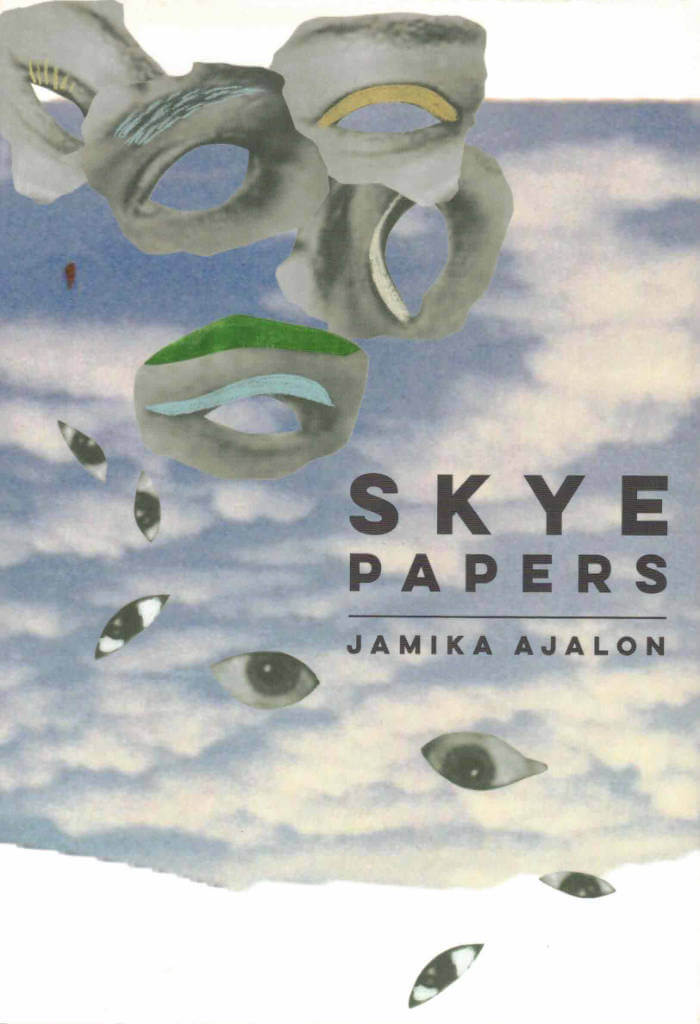
Skye Papers
A dreamy and experimental portrait of young Black artists in the 1990s London underground scene, whose existence is threatened by the rise of state surveillance.
Twentysomething and restless, Skye flits between cities and stagnant relationships until she meets Scottie, a disarming and disheveled British traveler, and Pieces, an enigmatic artist living in New York. The three recognize each other as kindred spirits—Black, punk, whimsical, revolutionary—and fall in together, leading Skye on an unlikely adventure across the Atlantic. They live a glorious, subterranean existence in 1990s London: making multimedia art, throwing drug-fueled parties, and eking out a living by busking in Tube stations, until their existence is jeopardized by the rise of CCTV and policing.
In fluid and unrelenting prose, Jamika Ajalon's debut novel explores youth, poetry, and what it means to come terms with queerness. Skye Papers is an imaginative, episodic group portrait of a transatlantic art scene spearheaded by people of color—and of the fraught, dystopian reality of increasing state surveillance.